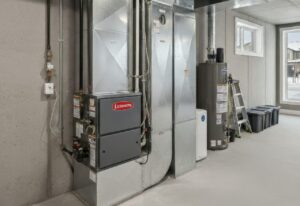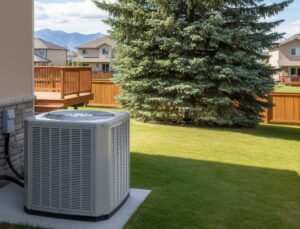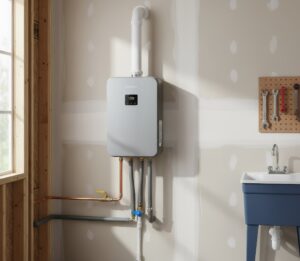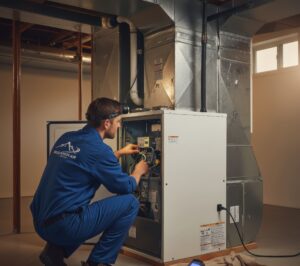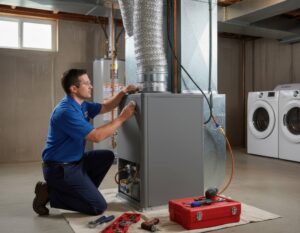Did you walk past your furnace and notice water on the floor?
Water leaks are an alarming site for homeowners in Alberta—and should never be ignored. Furnaces can leak water for many reasons but if the furnace humidifier is leaking rather than the main unit, we can narrow the causes down a little.
Furnace humidifiers add moisture to dry air and are mounted onto the furnace, powered by the HVAC system’s central control board. Many Alberta homeowners choose these devices rather than standalone humidifiers because they work for the whole home rather than just limited areas.
Let’s look at the main reasons why furnace-mounted humidifiers leak—and how to fix the problem if it happens in your home.
Reasons why your furnace humidifier is leaking water—with fixes
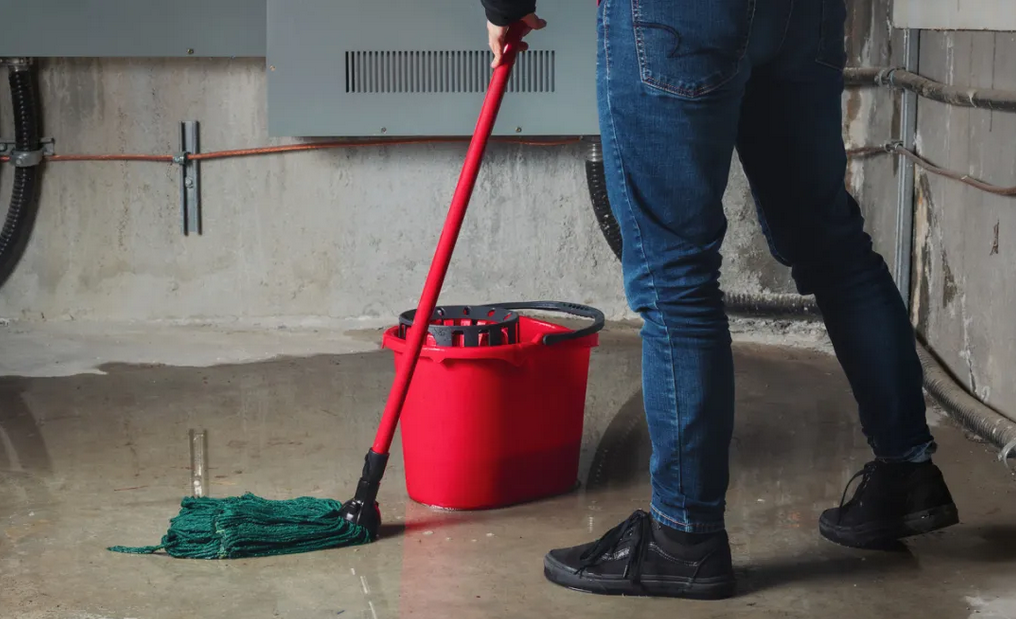
Generally, a furnace humidifier leaks water for one of a few reasons: clogged drain lines, a blocked drain pan, faulty water supply connections, a clogged water evaporator pad, a damaged water distribution tray or a malfunctioning valve.
These problems shouldn’t ordinarily occur in a modern, professionally installed, and well-maintained heating system but sometimes hiccups in the system need troubleshooting or old humidifiers start to fail.
The hard water around Calgary, in particular, can create problems with mineral deposits building up. However, the root cause of water leaking from a furnace humidifier can be improper installation or a lack of maintenance.
Let’s delve deeper into the main reasons for furnace humidifiers leaking water and the best fixes for these issues…
Clogged drain lines
The humidifier’s role is to add moisture to the air and, for this, it needs a water supply. However, if the humidifier’s drain hose has a kink in it or is clogged, the incoming water can back up and begin leaking out of the unit.
Also, the drain line must run on a continuous slope to the drain or air locks may force water to back up into the drain line.
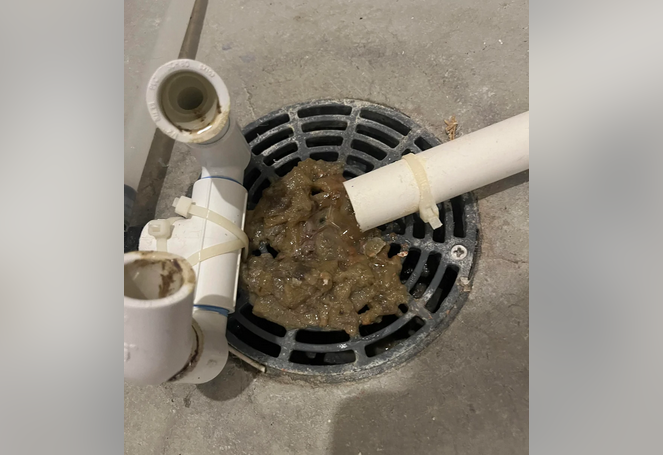
The fix:
First, check that the hose is not kinked between the humidifier and the drain source. If that’s not the problem, detach the hose from the drain pan and inspect it for clogs. If there are visible clogs, compressed air can clear it but this job may be best left to a furnace maintenance professional.
You should also remove upward or downward slopes from the humidifier drain line and flush it with water.
A clogged water evaporator pad
Humidifiers rely on a water supply to the evaporator pad to add moisture to the indoor air.
If the evaporator pad becomes clogged with calcium or other mineral debris, the incoming water may simply run along the top of the pad and drip down outside the water collection tray.
Replacing the evaporator pad is usually done as part of routine maintenance but if maintenance has been neglected, leaking water can result.
The fix:
If the furnace humidifier’s evaporator pad is blocked, it’s best to replace it. The humidifier may have a scale control insert which is blocked and stops performing. If so, clean this or replace the evaporator pad entirely.
Depending on the design of the humidifier, the water supply tube may have to be removed before cleaning or replacing the insert.
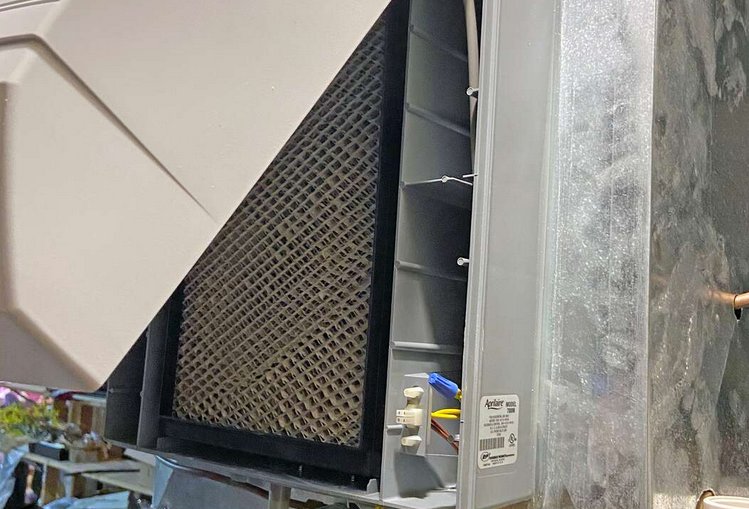
A blocked drain pan
The drain pan is responsible for collecting any excess water from the evaporator pad. The pan then directs the water into a household drain, preventing water leaks, as well as mold and mildew from forming.
If the humidifier’s drain pan is obstructed by mold or limescale, which can happen with Calgary’s notoriously hard, mineral-rich water supply, it can cause water to overflow onto the floor in your home.
The fix:
The drain pan will need to be removed first by detaching the necessary panels or housing to access it. Use a flat-head screwdriver to gently clear any deposits from the drain pan or simply replace the part if it is badly calcified.
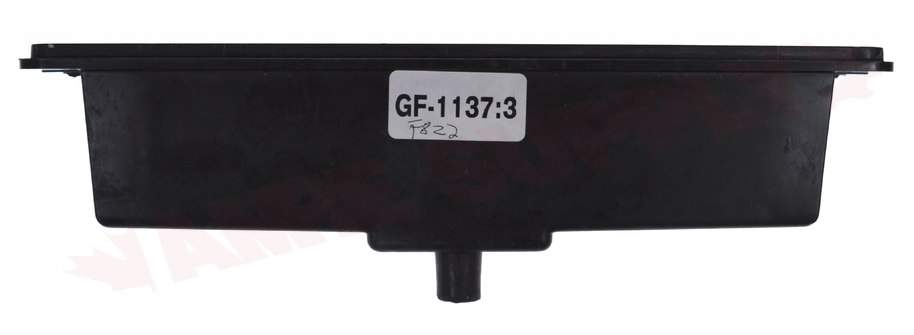
Faulty water line connections/valves
The water supply to your furnace humidifier delivers the water that is added to the air inside your home.
If one of the water lines has cracked, it may start to visibly leak water. If a valve starts malfunctioning, this can also lead to leaking water problems from your furnace humidifier.
Sometimes, a piece of debris or calcium deposit lodges between the valve’s plunger and the valve opening, preventing it from closing correctly and completely. This can also cause a leak.
The fix:
Inspect the water lines for damage. If they’re damaged in any way, call a professional out to install a new water line.
Also, check for a loose or corroded fitting at the water inlet valve. Any visible signs of damage will likely mean a new water line needs to be installed.
If something is preventing a valve from opening and closing properly, shut off the water supply, cut the power, and remove the valve. Furnace repair professionals may run pressurized water or air through the valve to clear the blockage.
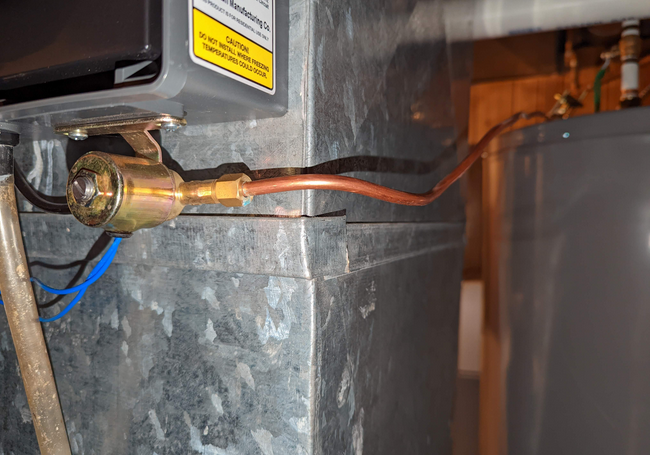
A damaged water distribution tray
The water distribution tray sits on top of the evaporator pad. It’s responsible for directing the water to drip evenly into the pad.
If the distribution tray becomes damaged, clogged or misaligned, water may leak outside the humidifier and end up pooling on the floor.
The fix:
If the tray is not seated properly on the evaporation pad, adjust it. If you notice any cracks or other damage, replace the old tray with a new one.
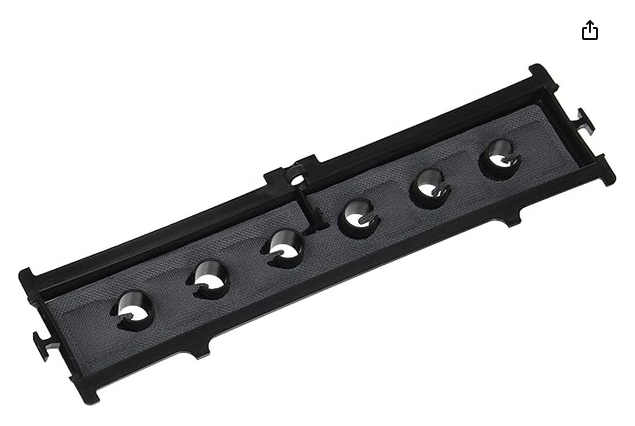
A malfunctioning water inlet valve assembly
For an effective flow of water to the humidifier, a water inlet orifice works in tandem with an inlet valve assembly controlled by an electric solenoid (usually a low-voltage device powered by a transformer mounted to the furnace).
A humidistat (like a thermostat but for moisture content in the air) controls the opening and closing of the solenoid. If there is a failure here, the system may not shut off the water supply to the humidifier when the air is moist enough, causing water to flow continuously and eventually leak.
The fix:
Replace or repair the solenoid valve. This should only be attempted by a licensed furnace professional.
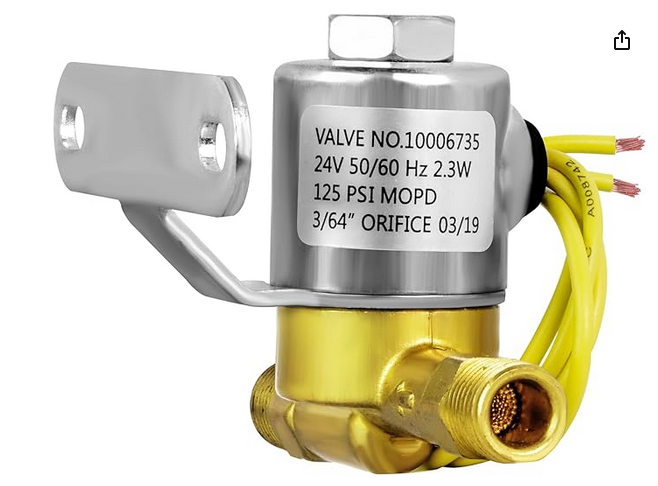
Additional tips for repairing leaking furnace humidifiers
If you need to replace any parts of your furnace humidifier, use genuine parts from the manufacturer rather than cheaper alternatives.
Generally, the same recognizable manufacturers make furnace humidifiers as make the furnaces themselves, such as Lennox, York, Goodman, Carrier, Bryant, etc. When you are comparing furnaces and the costs of installation, check to see if a humidifier is included in the price.
The furnace humidifier affects humidity levels in the entire home so it’s best not to gamble with quality when you fix it.
The best way to ensure that the right parts are replaced and fixes are more than just temporary “patch-ups” is to hire reliable furnace professionals to do the work. Ask for an estimate of the furnace repair costs at the time of booking repairs.
Unless you’re an experienced DIYer with a good understanding of furnaces and humidifiers, the work is best left to the professionals, especially considering there are always safety issues at play with gas-powered furnaces.
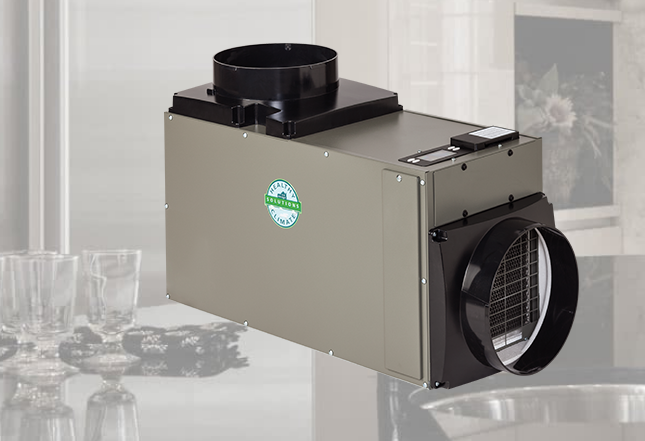
How do humidifiers work—and why do Alberta homes need them?
Most Alberta homes suffer from dry air in winter because the heating system is on almost permanently in those months.
Dry air can lead to allergies, skin dryness/irritation, and dry eyes, as well as irritation of respiratory problems, such as asthma. Excessively dry air can also cause static electricity buildup.
A whole-home humidifier mounted on the furnace is the best solution to address this issue. This will add humidity to the warm air that the furnace creates and then the humid air is dispersed throughout the house.
You can read more about the ideal humidity levels in Alberta homes throughout the year here.
During furnace installation, you may be offered the option of installing a whole-home humidifier.
A furnace-mounted humidifier is attached to either the warm air duct or the return air duct and is powered by the furnace control board. The humidifier operates while the furnace blower fan is running. The furnace control board sends low-voltage current to the humidifier via a transformer.
The humidifier can run even when the furnace is not producing heat if the thermostat setting of the furnace is set to run the blower fan only.
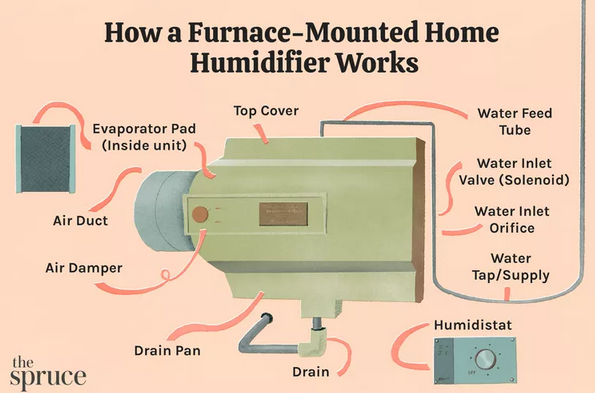
How to prevent furnace humidifier problems
With furnace humidifiers, prevention is better than cure, like with most furnace issues. After all, furnaces don’t come cheap and you likely spent a lot of money on installing your furnace, as well as every month on energy costs. It makes good economic sense to look after this investment.
With this in mind, don’t neglect regular furnace maintenance as this will prevent future issues both with the heating system and the humidifier.
Typical maintenance tasks associated with the furnace humidifier include:
- Replacing the evaporator pad/filter pad periodically
- Cleaning the interior of the unit, including the drain pan
- Checking for and clearing any blockages
- Testing the valves
- Checking for any other wear and tear
Ideally, basic cleaning should be conducted every few months and other deeper cleaning tasks and furnace maintenance should be conducted annually before the onset of the coldest weather.
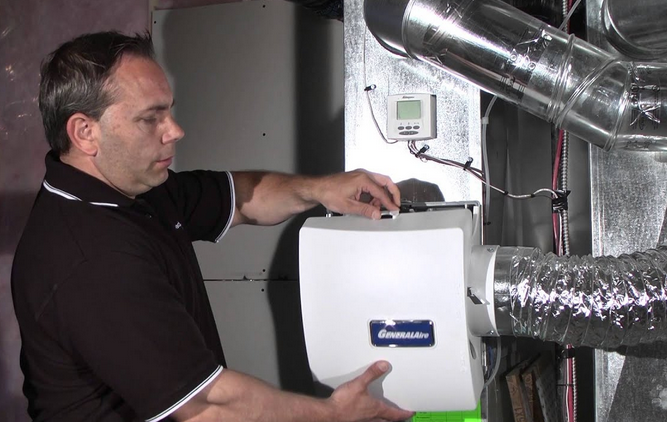
Professional furnace maintenance and repairs in Calgary
While a furnace can leak because of condensation, heat exchanger problems, exhaust issues or other reasons, humidifier issues are another common reason for pools of water on the floor.
Don’t be too alarmed if this happens—but don’t ignore the problem. There’s usually a relatively simple and affordable fix for furnace humidifier leaking water. Most furnace issues, however (including leaky whole-home humidifiers), require professional fixes.
For safe and efficient furnace repairs, talk to the team at Alberta Mountain Air. Call us at 403-236-4366 or contact us online to book repairs.
